
Being OCD About OCD Recovery
Towards the end of my recovery journey, I experienced something very unique: getting OCD compulsions about my own recovery process! Instead of getting compulsions related to the “usual” fears (such as washing my hands excessively due to fear of contamination, or negative intrusive thoughts about my family and loved ones), I observed that I was getting intrusive thoughts about my own recovery practice. I would have thoughts like: What if you’re not doing ERP or ACT correctly? What if everything you learned in ERP/ACT was a lie? What if everything that you’re doing to beat OCD is actually making it worse?
Basically, my OCD was attacking my recovery process in a last ditch effort to keep itself alive. The “old” fears and compulsions no longer held any control over me nor caused me any anxiety, so by attacking my recovery efforts, OCD was still trying to retain one last foothold in my mind.

How Can I Tell What’s an Intrusive Thought? (and why this is a trap!)
Something that I struggled with during the worst parts of my battle with OCD, and something which I’m sure many others have challenges with, was asking myself: how can I tell if the thoughts I’m having are intrusive thoughts? Of course, it’s easy to say: intrusive thoughts are unwanted and you should just ignore them. But I would often second guess myself and wonder: do I secretly want these thoughts? Do I actually enjoy them? Maybe they’re not intrusive thoughts and they’re actually “real” thoughts that I want to happen! Oh no, what does that mean about me??
If this sounds like you, then my advice is to take a step back, breathe, and continue reading.

Do You Need Medication?
A couple months ago, I wrote a blog post titled Do You Need a Therapist?, which addresses my thoughts on this oft-asked question by people suffering from OCD. As a follow-up to that, I also wanted to write a short blog post specifically on another frequently asked question: do you need medication to recover from OCD?

Can ERP Become a Compulsion?
I was inspired to write this blog post based on a conversation I had with someone about ERP, particularly when it comes to forcing yourself to face triggers/exposures (the “Exposure” part of ERP) so that you can then practice eliminating the compulsions tied to those triggers (the “Response Prevention” part of ERP). When first starting therapy and practicing ERP, this is a pretty typical exercise. You sit down, identify your triggers (sometimes ranking them in a hierarchy from “most” to “least” triggering), identify the compulsions you would typically perform in response to those triggers, and then try purposefully putting yourself into exposure situations so that you can work on preventing those compulsions.

The Power of Positive Thinking
It’s been a few weeks since I last posted on my blog due to a bunch of life changes - my wife and I bought a new house and have been busy moving in, I got assigned to some new projects at work which have been challenging but rewarding, and…. I injured my foot and have been busy doing physical therapy and rehab. So there’s been quite a few new changes in my life recently (mostly positive) but also a major negative change which has impacted my normal way of living.

Winter Storm Reflections
I live in a state that was severely impacted by the recent North American winter storm. During this storm, myself (along with millions of others) spent days without power, running water, heat, and internet, all while under below freezing temperatures. Even now as I am writing this blog post, thousands of people in my city are still without power, nearly six days after the storm first hit.
Making it through the worst of the storm was an interesting experience. For my state in particular, we had very little infrastructure or preparedness to weather the intensity and severity of the storm (some people are describing it as the worst winter storm in decades). As a result, many people were caught off-guard and had to scramble to survive for days without adequate power, water, or food. It’s truly a heartbreaking experience to see so many stories of people struggling for basic amenities that we would normally take for granted.

New Year’s Resolutions
With 2020 in the rear-view mirror and a New Year upon us, I’d like to dedicate my first blog post of 2021 to outlining my personal New Year’s resolutions. I know some people think New Year’s Resolutions are a bit tacky, but for me, it helps to “reset” my goals and set some new targets to aim for.
I’d also encourage you to think about your own personal goals as well - what do you want to achieve this year, and how will you measure your progress? This can be related to OCD recovery - but remember to keep your goals SMART (Specific, Measurable, Achievable, Relevant, and Timely). I believe many people fail at setting goals or fail with New Year’s resolutions because they don’t set SMART targets. For example, let’s say your 2021 resolution is to “recover from OCD.” That’s a pretty generic and high level goal!

Growth is Not Being Comfortable
I am an avid endurance athlete. I love running marathons and cycling outdoors on my bike. There’s just something freeing about being able to step out the door, away from all of life’s distractions and general busy-ness, and having an hour or two completely to myself and the open road. My daily workout session is always something that I look forward to, as it’s a chance to do something I love, an opportunity to grow and challenge myself physically, and also a time to take a step back and practice mindfulness (focusing on things like my breathing, the pounding of my feet on the pavement, my heart rate, and the feel of the wind on my face).
There are a number of athletes that I follow on Youtube and one of them (Tyler Pearce, aka Vegan Cyclist) made an interesting video the other day discussing how he has “failed” at certain points in his life, but how he was able to learn and grow from those failures and ultimately become stronger. In particular, when describing his personal fitness journey, he says: “Growth is not being comfortable.”

Don’t Dwell on the Past (Live Mindfully)
Something that I believe a lot of OCD sufferers struggle with (at least, I know I did) is dealing with the inability to move on from past mistakes or actions, whether real or perceived. When we struggle with OCD, we struggle with the ability to accept uncertainty and to live mindfully, because we often get too caught up in our heads catastrophizing on “what if?” scenarios. What if I left the stove on and I’ll come back home to find out my house burned down? What if I accidentally typed something nasty in that work email I sent and I’ll get fired tomorrow morning? What if that bump in the road was actually me hitting and killing someone? What if, what if, what if…?
Your brain can come up with a million different ways to create uncertainty and force you into compulsions like rumination and checking, because that’s how it gets relief. The problem with this, as I’ve detailed in this blog post, is that by doing the compulsions, you are reinforcing the OCD cycle in your brain and inadvertently making this disorder stronger. The key to beating OCD lies in mindfulness and acceptance.
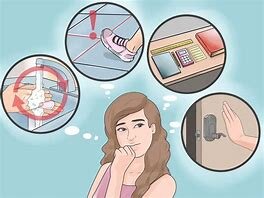
Avoid Turning ERP Into a Compulsion
For this week’s blog post, I wanted to write about a good recovery lesson that I learned towards the tail-end of my recovery process. If you’ve been reading my blog regularly, you’ll know how much I harp on Exposure Response Prevention (ERP) as being absolutely necessary for facilitating your OCD recovery - it is often regarded as the Gold Standard for OCD treatment for a good reason! When implemented properly and executed consistently, ERP absolutely will work.
When you’re first starting out with practicing ERP, common exercises will include things such as exposing yourself to your triggers and purposefully preventing the response. So for example, if you have an obsessive fear of contamination and compulsively wash your hands to negate that fear, you might do something such as touching a contaminated surface and then steadfastly refusing to wash your hands. That’s a very common and simple example of an ERP exercise, and it works extremely well by breaking the OCD cycle which I explain here.
As you get farther along in recovery and get comfortable tackling bigger and more stressful exposures, it’s easy to get wrapped up in the desire to seek out new exposure opportunities in order to practice ERP and improve your mental health and fitness. And that’s great - but it can also be a double-edged sword. This was something in particular that I began to realize as I felt more and more confident in my recovery - I had such a burning desire to be free from OCD that I would purposefully seek out or create OCD exposures to practice response prevention. So as an example, I would purposefully think terrible thoughts in my mind as a way to “prove” that I wasn’t affected by them.
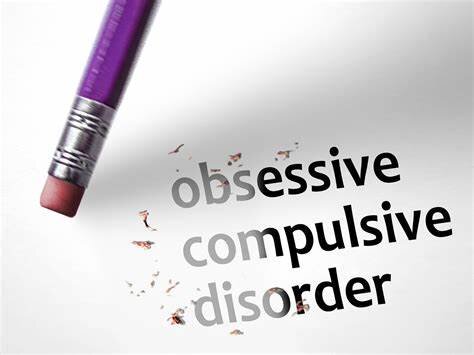
General OCD Recovery Tips
For this week’s blog post, I was reflecting on some general advice and guidance that I had learned (or was taught to me) during my own recovery journey, and which might be useful to share with readers of my blog who are struggling with OCD.
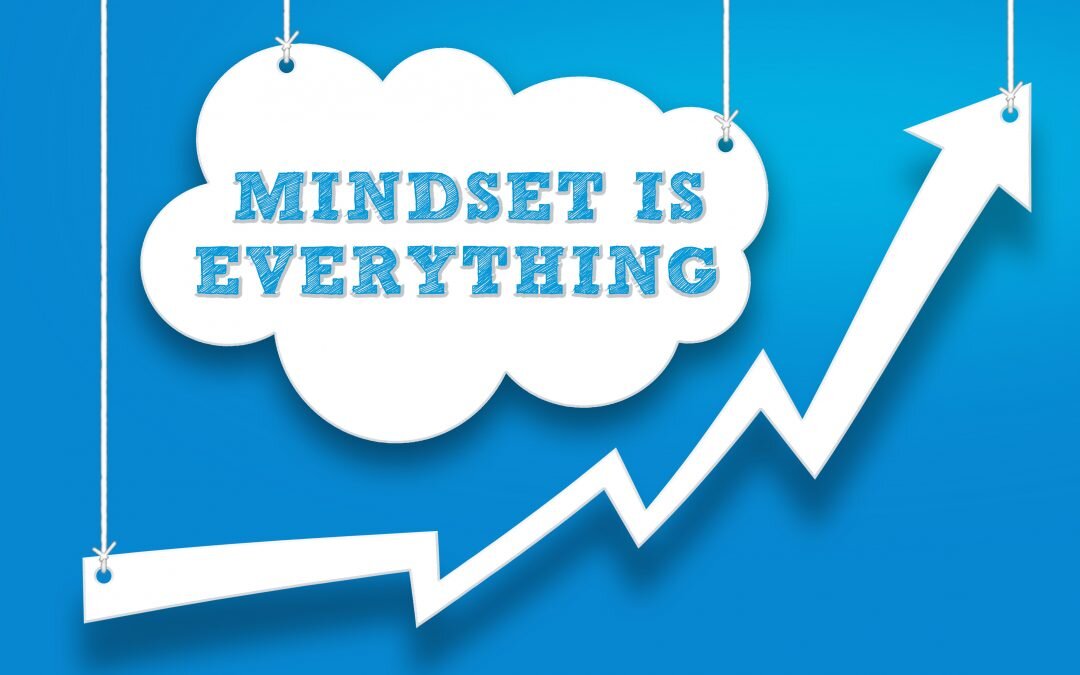
Do I still get Intrusive Thoughts? (What does Recovery look like?)
Something that I get asked relatively frequently is: “do you still get intrusive thoughts or anxiety once you’ve recovered from OCD? What does recovery even mean? Is that even possible?”
It’s a great question, and I also think it deserves a nuanced answer. OCD is such a complex mental disorder that it’s difficult to set one standard of recovery for everyone, because every person has different obsessions, compulsions, and mindsets. For something like the flu, it’s very easy to understand if you are recovered or not. It’s a black and white answer: either you have the flu or you don’t. But it’s much trickier to say this for OCD.
My high level definition of OCD recovery means having the knowledge, skills, and mindset you need to handle any uncertainty, thought, or feeling that may pop up in every day life. Note that I did NOT say OCD recovery means "never" getting anxious, or “never” getting intrusive thoughts. Indeed, I think that is a fundamental fallacy that many people who are beginning their OCD recovery journeys fall for. You might say: “I hate these intrusive thoughts! I can’t stand the sense of anxiety I get from them. I can’t tolerate uncertainty. I want to recover from OCD so that I never get these thoughts and feelings ever again!”
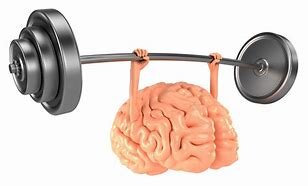
Mental Fitness is like Physical Fitness
Training your mental health and fitness is basically the same as training your physical health and fitness.
What do I mean by that? Let me explain. I think that most people, even those who aren’t necessarily gym-goers or athletes, can fundamentally understand the basics of training and improving your physical fitness. People go to the gym and lift weights, and if you do this consistently, you gradually build up the amount of weight that you can lift. Or with running - people start out running and can barely make it half a mile before being out of breath. But if they follow a training plan and run consistently, they might be able to run a full marathon (26.2 miles) in a year or two! It’s very easy and intuitive to understand how you can improve your physical health and fitness - all it boils down to is consistent training and quality workouts.
So, how does this tie back to mental health, and more importantly, OCD recovery? A common theme that I see with OCD sufferers (and something which I experienced myself, going through recovery) is that they are afraid to improve their mental fitness. They are used to, and comfortable with, doing the compulsions, ruminations, and being afraid of their intrusive thoughts. All of this is only strengthening OCD’s hold on you and degrading your mental health - it’s basically the equivalent of letting your brain sit on the couch all day eating nachos. What you need to be doing instead is improving your mental fitness through ERP exercises - refusing to do compulsions, refusing to ruminate on your obsessions or trying to figure out “what if” scenarios, and refusing to let feelings of anxiety/uncertainty/fear/etc… control your life.

Know Your Enemy
“If you know the enemy and know yourself, you need not fear the result of a hundred battles.” - Sun Tzu
The first step to beating OCD is understanding how and why it works.
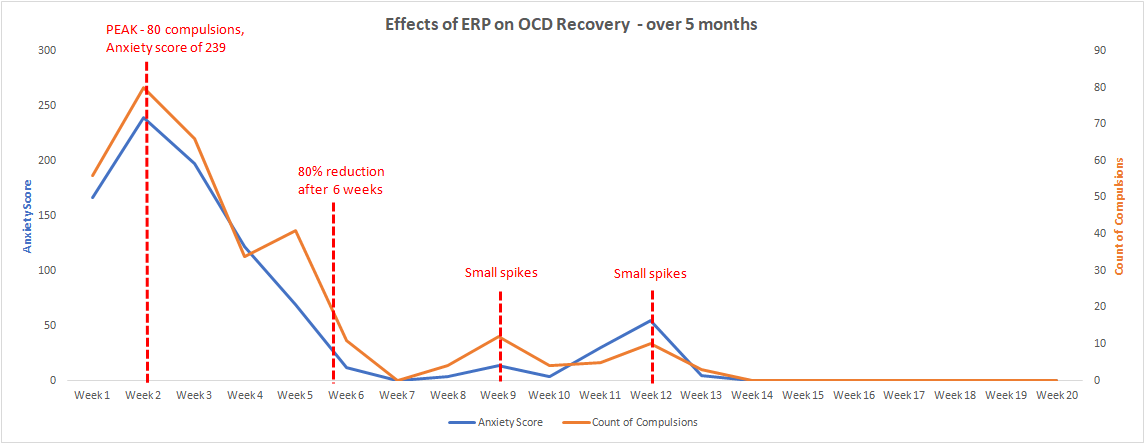
Graphing my OCD Recovery with Data
One question that I often see from OCD sufferers is: “How long will it take me to recover? What does the journey to OCD recovery look like?” So I thought that it would be helpful for readers of my blog to explain my own OCD recovery journey, the process, and some of my key learnings on the way.
I am a data junkie. I process and analyze lots of data as part of my day job. When I’m training for marathons, I analyze information about my heart rate and mile splits. So a more data-driven approach to OCD recovery felt natural to me, because I could hold myself accountable to actual results, and also be able to understand any underlying trends or patterns about how my progress was going.
Before going further - I want to set the disclaimer that this was my own recovery journey, and what worked for me personally. Even if the underlying principles of OCD recovery (e.g. ERP) are the same for everyone, your own personal recovery journey might look different. Some exceptional people might recover in 1 or 2 months of dedicated ERP. Some people may take longer. As you can see from my chart below, it took me approximately 5 months. I say this because I don’t want to discourage anyone if they feel like they are making progress too slowly - OCD recovery can and will differ from person to person. If someone says, “I recovered in a month!” and you’ve been struggling with ERP for a year, don’t assume that you are doing something wrong or feel discouraged. OCD recovery is highly personal to each individual and you shouldn’t benchmark your own progress against someone else’s. No matter what, you should trust in the process and trust that a dedicated CBT regimen like ERP or ACT will help you recover, no matter how long it takes.
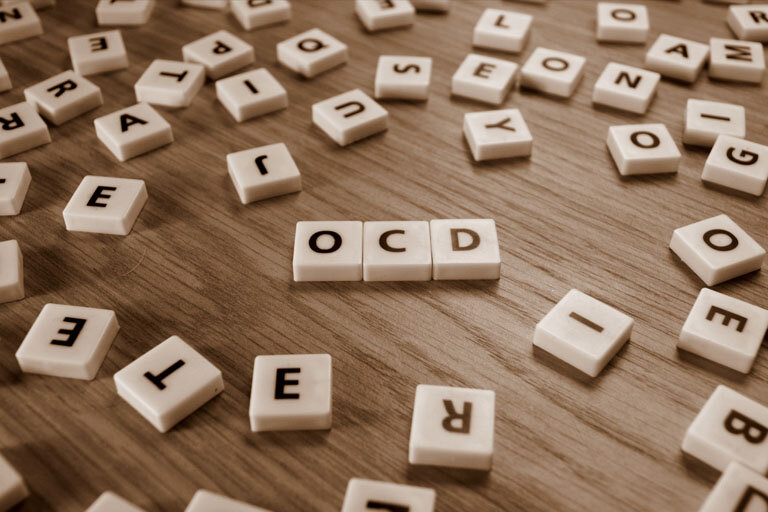
My Recovery Journey and Why I’m Writing this Blog
I’ve suffered from Obsessive Compulsive Disorder (OCD) for most of my life (thirty years), although I didn’t always realize that my compulsive habits, mental tics, and constant feelings of anxiety were actually caused by OCD. In fact, as I suspect is the case for many OCD sufferers, I thought I couldn’t possibly have OCD, because I didn’t obsessively clean my kitchen or re-arrange the pens on my desk, like how it is often portrayed in social media and pop culture.
All I knew was that something was wrong with me - I had horrible, disgusting intrusive thoughts almost 24/7, starting in my late teens and lasting well into adulthood. I would feel compelled to do specific activities a certain number of times in order to prevent some horrible catastrophe from occurring in the future, or constantly ask myself why I had such evil thoughts and mental images and if that meant that I, too, was an evil person who did not deserve happiness or love. I did have some physical compulsions (checking doors and locks, re-reading emails at work) but most of my compulsions were mental - things like constantly ruminating about past events, wondering if I had said something offensive to someone at some point, or being terrified of having random sacrilegious or blasphemous thoughts pop up in my head, amongst other fears. As a result of my compulsions being primarily mental, I was able to hide my condition quite well from friends, family, and coworkers - indeed, if you told any of them that I spent the better part of the past ten years wracked in constant anxiety and depression, they would be incredibly surprised. I was able to function as a human in every day normal life - but my mind was a constant battlefield with me warring against the demons in my head.